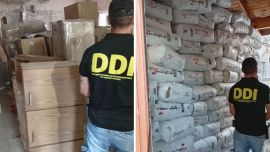The dead-cat bounce has arrived for Argentina.
After a brutal three-day sell-off that saw average yields spike to 21 percent and an implied probability of default gauge surge above 80 percent, investors finally found prices cheap enough to begin taking risk in the battered credit.
The peso gained six percent to 57 per dollar in Buenos Aires Thursday. The extra yield investors demand to own government debt over US Treasuries narrowed 1.8 percentage points to 17.73, the highest in emerging markets, while bonds jumped as much eight percent. Still, bonds are trading between 47 and 57 cents as the market reassessed the chances of repayment under a potential opposition administration. The benchmark Merval stock index also rose today.
“Risk-reward is attractive,” said Shamaila Khan, the head of emerging-market debt at AllianceBernstein in New York. “The risk of restructuring is not insignificant if the economy continues to deteriorate, but there will be strong incentives for any new administration to avoid that.”
Analysts and money managers including Dupont Capital Management and Barings LLC are starting to glimpse a silver lining. While the political outlook after the upset in the primary election on August 11 that sparked the market carnage hasn’t changed much, some signs of cordiality emerged between President Mauricio Macri and his front-runner opponent Alberto Fernández.
Fernández, who took a commanding 15-point lead in the primary ahead of October 27 elections, spoke with Macri on Wednesday. An economist close to the leftist candidate vying to unseat the market-friendly administration also made encouraging comments about maintaining monetary policy, fiscal discipline and seeing the current exchange rate as being fair value.
Buying bonds
Yong Zhu, who helps manage US$10.8 billion at DuPont in Wilmington, Delaware, says that he’ll gradually start increasing his Argentine bond exposure because the debt is simply too cheap to ignore.
“The market is pricing a pretty significant risk of default in the near future,” Zhu said in an interview. “But I don’t think they’re going to default right away.”
Stocks may also be on course to return to levels closer to at least those earlier this year, said Chelsea Rodstrom, an emerging-market analyst at Global X, a unit of Mirae Asset Global Investment. Macri’s policies will stay in place at least until the election, and improved data as the economy emerges from recession may also buoy the market, the New York-based analyst said in an interview.
“There is certainly a buying opportunity,” she said. “It seems like markets might be overreacting to what’s going on in Argentina and not looking toward the longer term.”
Valuations look cheapest in industries such as energy, banking and utilities, she said. A good soy and corn harvest will also bode well for the economy, while trade tension between the US and China could give Argentine farmers the chance to compete more aggressively in the global market, Rodstrom said. The Merval plunged by 48 percent on Monday in dollar terms.
Peso potential
As for the peso, Ricardo Adrogue, head of global sovereign debt at Barings in Boston, Massachusetts, said he’s “comfortable” with the overweight stance he began in April, though he’s not adding to it because the market’s too illliquid.
“It’s incorrectly perceived that Fernández will let the currency depreciate at the expense of very high inflation,” said Adrogue, who helps oversee $9 billion in emerging-market assets.
Argentina has more than US$60 billion in foreign reserves, and Cristina Fernández de Kirchner, Alberto Fernandez’s running-mate, “has shown willingness to use it in the past” to ease currency pressure, he said.
Should Fernández win the presidency, Adrogue expects the currency to stabilise.
by Daniel Cancel, Justin Villamil & Sydney Maki, Bloomberg




















Comments